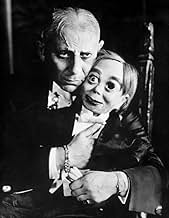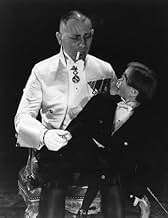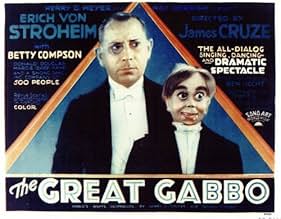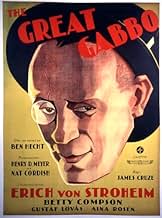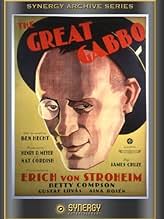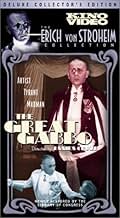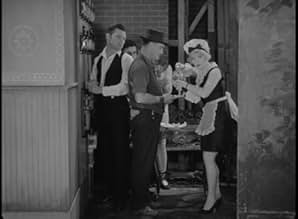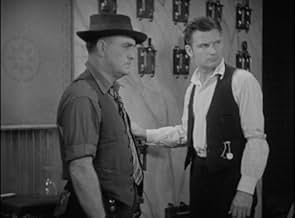AVALIAÇÃO DA IMDb
6,0/10
1,1 mil
SUA AVALIAÇÃO
Um ventríloquo egocêntrico louco, embora possuído por seu boneco de madeira, está apaixonado por uma dançarina apaixonada por outro. A boneca dá conselhos ao ventríloquo.Um ventríloquo egocêntrico louco, embora possuído por seu boneco de madeira, está apaixonado por uma dançarina apaixonada por outro. A boneca dá conselhos ao ventríloquo.Um ventríloquo egocêntrico louco, embora possuído por seu boneco de madeira, está apaixonado por uma dançarina apaixonada por outro. A boneca dá conselhos ao ventríloquo.
- Direção
- Roteiristas
- Artistas
Erich von Stroheim
- The Great Gabbo
- (as Eric Von Stroheim)
Marjorie Kane
- Babe
- (as Margie 'Babe' Kane)
George Grandee
- Otto
- (narração)
- (não creditado)
Bo Peep Karlin
- Dancer
- (não creditado)
Rosina Lawrence
- Dancer
- (não creditado)
Harry Ross
- Performer
- (não creditado)
Eddy Waller
- Vaudevillian
- (não creditado)
Marbeth Wright
- Dancer
- (não creditado)
- Direção
- Roteiristas
- Elenco e equipe completos
- Produção, bilheteria e muito mais no IMDbPro
Avaliações em destaque
Clunky solid gramophone sound and some sensational Ziegfeld stage numbers make this early talkie musical drama a real treat for viewers forgiving of 1929 movies. Vile schizophrenic ventriloquist brute, Von Stroheim, with his very creepy dummy (like the terrifying one in the DEAD OF NIGHT sequence with Michael Redgrave) seem somehow to be the toast of the stage. This 1929 showcase for both the technology of the day and the stage and screen stars rightly celebrated over the period are shown to be both fascinating and versatile as this film progresses. Other comments on this site will tell you the story and some criticize it's 1929 limits, but really THE GREAT GABBO is an excellent film of its day that rightly and clearly shows the force of Von Stroheim and the expert stage and screen dance entertainment popular in the 20s in the Ziegfeld sequences seemingly filmed right in front of a real stage. If you have seen THE BOYFRIEND the 1970 Ken Russell comedy you will get an idea of how fabulous THE GREAT GABBO must have looked in color. Most of the massive stage scenes are pale in my B/W copy and clearly are those sequences in Multicolour which the opening credits alert us to (be missing). Betty Boop sister Majorie Kane appears and most of the musical numbers are hilariously delightful, crowded with teens leaping about and bumping into each other in a great array of all sorts of fantasy costumes. The silliest and most enjoyable of which is a spider and fly number in which the above quote is hissed during a squabble in between verses. THE GREAT GABBO is a major find for students of 20s art deco, early talkie technology and very strong and effective acting. Von Stroheim must have been such a pain to Hollywood, a brute on screen and off. This film is full of wow! scenes. Highly recommended for anyone wanting further insight into the era. Other films worth seeing that add to the experience are GLORIFYING THE American GIRL, and THE 1929 SHOW OF SHOWS. The sound on my DVD copy is very good.
As director and actor Erich Von Stroheim did some very weird films and The Great Gabbo is certainly one of them. In this Von Stroheim is a star attraction in a Ziegfeld Follies type stage review and he is fixated on Betty Compson who used to be his assistant in his act, but walked out on him because he treated her shabbily.
Now she is keeping company with Donald Douglas a young hoofer in the show. He's actually upset as well with her interest in Von Stroheim.
In a way it's hard to review this because just the name of Erich Von Stroheim brings up images of barbaric cruelty show on the screen. The name alone is sufficient to conjure up horrible images.
So Von Stroheim wants to set up house with her and his dummy Otto. As in most ventriloquist stories the dummy functions as an alter ego.
All this with the backdrop of a Ziegfeld type show. That was interesting and like Glorifying The American Girl, The Great Gabbo is a nice filmed record of what these shows were like on stage.
Although Von Stroheim is always interesting, The Great Gabbo's best value is as a record of the type musical revue so popular back then.
Now she is keeping company with Donald Douglas a young hoofer in the show. He's actually upset as well with her interest in Von Stroheim.
In a way it's hard to review this because just the name of Erich Von Stroheim brings up images of barbaric cruelty show on the screen. The name alone is sufficient to conjure up horrible images.
So Von Stroheim wants to set up house with her and his dummy Otto. As in most ventriloquist stories the dummy functions as an alter ego.
All this with the backdrop of a Ziegfeld type show. That was interesting and like Glorifying The American Girl, The Great Gabbo is a nice filmed record of what these shows were like on stage.
Although Von Stroheim is always interesting, The Great Gabbo's best value is as a record of the type musical revue so popular back then.
If there ever was any schizophrenic example of musicals then that would be 'The Great Gabbo'. This is disturbing psychological drama interrupted by lavish and wonderful dance and music numbers. James Cruze is credited as a director but to be honest most of the non-musical scenes have von Stroheim all written over them. And not only because von Stroheim played in them but there is some sort of very specific psychologically tense atmosphere in them. It is unknown to me how much control von Stroheim had over the production but it is clear (to everyone familiar with von Stroheim's work) that he at least gave some instructions.
The film is much more than just a curiosity - two seemingly different movies, a psychological drama, and a musical tied together. Erich von Stroheim brilliantly plays brilliant ventriloquist Gabbo who is mad or driven mad by his art. When we first meet Gabbo on the screen, we see an unpleasant cruel man who in his egocentrism and perfectionism blames everyone else for his failures. After his lover and partner Mary (Betty Compson) drops the tray in the middle of the performance, he accuses her again. She leaves her but not with a light heart. Pass the two years and they both have worked their way up into Broadway. They meet again when they both appear in the same review show.
The dramatic parts concentrating on Gabbo and his relationships with other people are good but quite poorly developed. Probably because of the forceful inclusion of the musical numbers that do nothing to forward the story or even add anything to it. And this is crystal clear while watching the movie. These would have worked in a lesser amount as just a backdrop for the story. Although, I have to say the musical numbers were interesting to watch but that was the wrong movie for them. The dramatic parts are heavy and the sudden transition into the musical numbers puts the viewer off. Although the musical numbers separately are interesting I found them distracting and thus it made it difficult to follow the story.
Although the movie is inconsistent and didn't quite work, it is still worth watching especially for its uniqueness in the musical category.
The film is much more than just a curiosity - two seemingly different movies, a psychological drama, and a musical tied together. Erich von Stroheim brilliantly plays brilliant ventriloquist Gabbo who is mad or driven mad by his art. When we first meet Gabbo on the screen, we see an unpleasant cruel man who in his egocentrism and perfectionism blames everyone else for his failures. After his lover and partner Mary (Betty Compson) drops the tray in the middle of the performance, he accuses her again. She leaves her but not with a light heart. Pass the two years and they both have worked their way up into Broadway. They meet again when they both appear in the same review show.
The dramatic parts concentrating on Gabbo and his relationships with other people are good but quite poorly developed. Probably because of the forceful inclusion of the musical numbers that do nothing to forward the story or even add anything to it. And this is crystal clear while watching the movie. These would have worked in a lesser amount as just a backdrop for the story. Although, I have to say the musical numbers were interesting to watch but that was the wrong movie for them. The dramatic parts are heavy and the sudden transition into the musical numbers puts the viewer off. Although the musical numbers separately are interesting I found them distracting and thus it made it difficult to follow the story.
Although the movie is inconsistent and didn't quite work, it is still worth watching especially for its uniqueness in the musical category.
The Great Gabbo "The Great Gabbo" is one of the finest examples of American Communist Propaganda films of the early 1900's existent today. It is a master piece of film literature, when you consider the limitations of the technology of the day. Vitaphone, the technology used to cut a vinyl record of the speech or music as the action was filmed, was new and very expensive, and made film editing a nightmarish chore if not impossible.
The script employ's Epic Theater techniques taught by Bertolt Brecht. In this respect it is a thinker's film, the film forces you to think. From the very beginning to the end you are constantly quizzical about behavior, motivation and environment. This is a musical comedy, right? How and why is the title card segment at the beginning of film different from other "musicals". Meet the self-absorbed individualist Gabbo who never acknowledges others who help him gain fame, his ventriloquist dummy Otto, and his stage partner Mary.
We soon realize that Gabbo has very superstitious religious beliefs. While he does not perform a sign of the cross, we know that he operates under the fear of his destined fate from unseen mystical powers. For instance when Mary inadvertently places his hat upon the bed, Gabbo calls Mary a foul name saying "Don't you know that it is bad luck?" Mary, in response, lists a series of activities which might displease and bring about the wrath of an angry immortal. She is more practical stating, "We make our own bad luck." The comparative is the communist environment of the musical theater. Everyone works and does their part for the betterment of the show. Here, once Mary leaves Gabbo, she too climbs to the top and find success in her profession as a singer and dancer with her partner/husband Frank. Gabbo and Mary are both successes in their professions, who then is happier? Who is more honest in their success? Capitalism is treated as an impertinent side note to the values being discussed. Capitalism is the financier management of the show and it seeks gain through investing in both ideals.
The film contrasts individualism versus communism. Many reviews have missed the underpinning effort of the writers and directors to use epic theater, and there blatant agenda to use it to teach the values of communism. They often deride the films production numbers as being unpolished and lacking flair. I ask, how could a film made with the intent to teach communistic ideals express them more eloquently? The ideal of community is not a flawless world, but a world where everyone does what they can to contribute to the whole. Some dancers lag behind the others yet they are there doing there part. Some simply walk from one place to another. The stage is full, busy and the message is understood. The imperfect dance numbers, in the epic theater style, emphasize the communistic ideal not detract from it. Few people would dare be as direct today.
The sad thing about communism's failure is that without community all we have left is individualists who, like Gabbo, are only self-absorbed and care nothing for their neighbor, nor acknowledge supportive people.
This film is a treasure that should be studied over and over. There are so many messages you simply can not absorb them in one viewing.
Watch for Otto's "I'm laughing" song sequence, it is a precursor to Bobby McFerrin's "Don't worry, Be Happy." An interesting comparison is with this film's theater community and with the community environment of Los Angeles in the modern movie "Crash." How are they the same? How are they different? How are messages of these two films different? How are they the same? Think about it.
If you don't own a copy of these films you should. I give "The Great Gabbo" two thumbs up and a black and blue stubbed toe. I guess I'm a little like Maryaccident prone. Oh and have a nice day. Be Happy!
The script employ's Epic Theater techniques taught by Bertolt Brecht. In this respect it is a thinker's film, the film forces you to think. From the very beginning to the end you are constantly quizzical about behavior, motivation and environment. This is a musical comedy, right? How and why is the title card segment at the beginning of film different from other "musicals". Meet the self-absorbed individualist Gabbo who never acknowledges others who help him gain fame, his ventriloquist dummy Otto, and his stage partner Mary.
We soon realize that Gabbo has very superstitious religious beliefs. While he does not perform a sign of the cross, we know that he operates under the fear of his destined fate from unseen mystical powers. For instance when Mary inadvertently places his hat upon the bed, Gabbo calls Mary a foul name saying "Don't you know that it is bad luck?" Mary, in response, lists a series of activities which might displease and bring about the wrath of an angry immortal. She is more practical stating, "We make our own bad luck." The comparative is the communist environment of the musical theater. Everyone works and does their part for the betterment of the show. Here, once Mary leaves Gabbo, she too climbs to the top and find success in her profession as a singer and dancer with her partner/husband Frank. Gabbo and Mary are both successes in their professions, who then is happier? Who is more honest in their success? Capitalism is treated as an impertinent side note to the values being discussed. Capitalism is the financier management of the show and it seeks gain through investing in both ideals.
The film contrasts individualism versus communism. Many reviews have missed the underpinning effort of the writers and directors to use epic theater, and there blatant agenda to use it to teach the values of communism. They often deride the films production numbers as being unpolished and lacking flair. I ask, how could a film made with the intent to teach communistic ideals express them more eloquently? The ideal of community is not a flawless world, but a world where everyone does what they can to contribute to the whole. Some dancers lag behind the others yet they are there doing there part. Some simply walk from one place to another. The stage is full, busy and the message is understood. The imperfect dance numbers, in the epic theater style, emphasize the communistic ideal not detract from it. Few people would dare be as direct today.
The sad thing about communism's failure is that without community all we have left is individualists who, like Gabbo, are only self-absorbed and care nothing for their neighbor, nor acknowledge supportive people.
This film is a treasure that should be studied over and over. There are so many messages you simply can not absorb them in one viewing.
Watch for Otto's "I'm laughing" song sequence, it is a precursor to Bobby McFerrin's "Don't worry, Be Happy." An interesting comparison is with this film's theater community and with the community environment of Los Angeles in the modern movie "Crash." How are they the same? How are they different? How are messages of these two films different? How are they the same? Think about it.
If you don't own a copy of these films you should. I give "The Great Gabbo" two thumbs up and a black and blue stubbed toe. I guess I'm a little like Maryaccident prone. Oh and have a nice day. Be Happy!
THE GREAT GABBO (Sono-Art, 1929), directed by James Cruze, adapted from the story "The Rival Dummy" by Ben Hecht, stars famed director and actor Erich Von Stroheim in his talkie debut as an egotistical ventriloquist named Gabbo, or should I say, THE GREAAAT GABBO. He not only performs on stage with his dummy, Otto, (Gabbo's better half) but talks to it in his dressing room, on the street and in restaurants, with the dummy himself talking back to him, especially when Gabbo is drinking water, eating or smoking a cigarette. He has an assistant named Mary (Betty Compson), with whom he constantly finds fault in her efforts. ("My coffee is too cold/ My coffee is too hot!" etc.) During one performance she accidentally stumbles and drops a tray, which infuriates him to criticize her action, causing her to walk out on him. As time passes, Gabbo increases his fame by becoming a featured headliner in the Manhattan Revue where Mary now performs as a singer and dancer along with her new partner named Frank (Donald Douglas). In spite that he is more conceited than ever, Gabbo decides he wants Mary back with him, but something happens that will cause Gabbo to go completely insane in a dramatic climax that disrupts the show.
Aside from long stretches of dialog and no underscoring, a common practice in early talkies, "The Great Gabbo," though not considered a musical, has its share of production numbers. What makes this 1929 movie stand out among other musicals at that time is that the orchestration during the stage numbers doesn't sound at all like the usual 1920s score but more-so something from the Ziegfeld Follies. The choreography, compliments by Maurice L. Kusell, unfortunately, does not have the creativity of a Busby Berkeley, for that mainly the girls on stage simply walk back and forth carrying umbrellas, do some dancing and ballet, but there are never any closeups and the camera seldom moves or intercuts, making some of the eight to ten minute production numbers appear to be a little longer than its time length. The tunes itself, however, aren't really bad to listen to, although none of them became popular on the Hit Parade. The opening credits listing mentions sequences in Multicolor, but the entire movie itself can be seen today only in black and white.
The songs (By Paul Titsworth, Lynn Cowan, Don McNamee and King Zany) from the existing film print include: "I'm Laughing" and "The Lollipop Song-Ickey" (both sung by Otto); "Every Now and Then" (sung by Marjorie Kane and Donald Douglas); "I'm in Love With You" (sung by Douglas and Betty Compson); "The New Step" (sung by Kane); "Caught in the Web of Love" (sung by Douglas and Compton/ chorus); "I'm in Love With You" (dance number); and a finale that includes a montage of dance numbers, including the cut number of "The Ga-Ga Bird" which is shown briefly. Of all the songs, only "Caught in the Web of Love" has a slow score, but a production number that sets Douglas and Compton as human spiders dancing in front of a giant spider web. "I'm in Love With You" is one of the better songs presented in the movie, that would be sometimes edited out from some TV prints. Marjorie "Babe" Kane (famous for her role as WC Fields' daughter in the comedy short THE DENTIST in 1932) supplies some comedy, songs and taps.
THE GREAT GABBO is Von Stroheim's show all the way, monocle and all, but not the voice that accompanies his dummy, Otto. In spite of slow spots, it's an interesting drama, original in theme and premise. One wonders if Rod Serling, host of TV's "The Twilight Zone" of the 1960s, had seen this movie, since there is an episode that I recall that involves a performer obsessed by his dummy and having conversations with it, for which the dummy runs and later ruins his life and career.
I last saw THE GREAT GABBO on Cable TV's The Nostalgia Channel in the early 1990s, and it used to be one of the movies shown on Public Television's SPROCKETS back in the early 1980s. This rarely seen antique, a real curio at best, can be found on video cassette through various distributors. For a best VHS or DVD print with clearer picture and sound quality, with restored opening and exit music (but minus the reported color sequences), the best recommendation is to obtain a copy from the KINO Video Company. (**)
Aside from long stretches of dialog and no underscoring, a common practice in early talkies, "The Great Gabbo," though not considered a musical, has its share of production numbers. What makes this 1929 movie stand out among other musicals at that time is that the orchestration during the stage numbers doesn't sound at all like the usual 1920s score but more-so something from the Ziegfeld Follies. The choreography, compliments by Maurice L. Kusell, unfortunately, does not have the creativity of a Busby Berkeley, for that mainly the girls on stage simply walk back and forth carrying umbrellas, do some dancing and ballet, but there are never any closeups and the camera seldom moves or intercuts, making some of the eight to ten minute production numbers appear to be a little longer than its time length. The tunes itself, however, aren't really bad to listen to, although none of them became popular on the Hit Parade. The opening credits listing mentions sequences in Multicolor, but the entire movie itself can be seen today only in black and white.
The songs (By Paul Titsworth, Lynn Cowan, Don McNamee and King Zany) from the existing film print include: "I'm Laughing" and "The Lollipop Song-Ickey" (both sung by Otto); "Every Now and Then" (sung by Marjorie Kane and Donald Douglas); "I'm in Love With You" (sung by Douglas and Betty Compson); "The New Step" (sung by Kane); "Caught in the Web of Love" (sung by Douglas and Compton/ chorus); "I'm in Love With You" (dance number); and a finale that includes a montage of dance numbers, including the cut number of "The Ga-Ga Bird" which is shown briefly. Of all the songs, only "Caught in the Web of Love" has a slow score, but a production number that sets Douglas and Compton as human spiders dancing in front of a giant spider web. "I'm in Love With You" is one of the better songs presented in the movie, that would be sometimes edited out from some TV prints. Marjorie "Babe" Kane (famous for her role as WC Fields' daughter in the comedy short THE DENTIST in 1932) supplies some comedy, songs and taps.
THE GREAT GABBO is Von Stroheim's show all the way, monocle and all, but not the voice that accompanies his dummy, Otto. In spite of slow spots, it's an interesting drama, original in theme and premise. One wonders if Rod Serling, host of TV's "The Twilight Zone" of the 1960s, had seen this movie, since there is an episode that I recall that involves a performer obsessed by his dummy and having conversations with it, for which the dummy runs and later ruins his life and career.
I last saw THE GREAT GABBO on Cable TV's The Nostalgia Channel in the early 1990s, and it used to be one of the movies shown on Public Television's SPROCKETS back in the early 1980s. This rarely seen antique, a real curio at best, can be found on video cassette through various distributors. For a best VHS or DVD print with clearer picture and sound quality, with restored opening and exit music (but minus the reported color sequences), the best recommendation is to obtain a copy from the KINO Video Company. (**)
Você sabia?
- CuriosidadesThe dummy Otto was a hand carved basswood Frank Marshall figure. The same man who designed Edgar Bergen's famous characters Charlie McCarthy and Mortimer Snerd.
- Erros de gravaçãoOverlooking the seeming impossibility of Gabbo having Otto the Dummy speak while Gabbo is eating, smoking, and drinking, Otto's head and mouth move with the words and music when Gabbo is at least six feet away.
- Versões alternativasO Grande Gabbo (1929) was originally released by Sono Art-World Wide Pictures, with certain sequences were presented in Multicolor. However, current prints, restored by the Library of Congress and released by Kino International on DVD, exist only in black-and-white. Most, perhaps all, VHS and DVD releases of the film have the color sequences in black and white.
- ConexõesEdited into The Girl from Calgary (1932)
- Trilhas sonorasEvery Now and Then
(uncredited)
Written by King Zany and Donald McNamee
Performed by Marjorie Kane and Donald Douglas
Principais escolhas
Faça login para avaliar e ver a lista de recomendações personalizadas
Detalhes
- Data de lançamento
- País de origem
- Idiomas
- Também conhecido como
- The Great Gabbo
- Locações de filme
- Empresa de produção
- Consulte mais créditos da empresa na IMDbPro
- Tempo de duração
- 1 h 32 min(92 min)
- Cor
Contribua para esta página
Sugerir uma alteração ou adicionar conteúdo ausente

